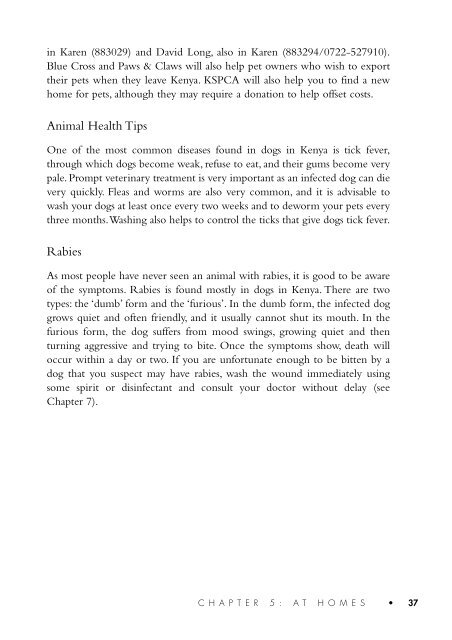KARIBU KENYA - UNON - the United Nations Office at Nairobi
KARIBU KENYA - UNON - the United Nations Office at Nairobi
KARIBU KENYA - UNON - the United Nations Office at Nairobi
You also want an ePaper? Increase the reach of your titles
YUMPU automatically turns print PDFs into web optimized ePapers that Google loves.
in Karen (883029) and David Long, also in Karen (883294/0722-527910).<br />
Blue Cross and Paws & Claws will also help pet owners who wish to export<br />
<strong>the</strong>ir pets when <strong>the</strong>y leave Kenya. KSPCA will also help you to find a new<br />
home for pets, although <strong>the</strong>y may require a don<strong>at</strong>ion to help offset costs.<br />
Animal Health Tips<br />
One of <strong>the</strong> most common diseases found in dogs in Kenya is tick fever,<br />
through which dogs become weak, refuse to e<strong>at</strong>, and <strong>the</strong>ir gums become very<br />
pale. Prompt veterinary tre<strong>at</strong>ment is very important as an infected dog can die<br />
very quickly. Fleas and worms are also very common, and it is advisable to<br />
wash your dogs <strong>at</strong> least once every two weeks and to deworm your pets every<br />
three months.Washing also helps to control <strong>the</strong> ticks th<strong>at</strong> give dogs tick fever.<br />
Rabies<br />
As most people have never seen an animal with rabies, it is good to be aware<br />
of <strong>the</strong> symptoms. Rabies is found mostly in dogs in Kenya. There are two<br />
types: <strong>the</strong> ‘dumb’ form and <strong>the</strong> ‘furious’. In <strong>the</strong> dumb form, <strong>the</strong> infected dog<br />
grows quiet and often friendly, and it usually cannot shut its mouth. In <strong>the</strong><br />
furious form, <strong>the</strong> dog suffers from mood swings, growing quiet and <strong>the</strong>n<br />
turning aggressive and trying to bite. Once <strong>the</strong> symptoms show, de<strong>at</strong>h will<br />
occur within a day or two. If you are unfortun<strong>at</strong>e enough to be bitten by a<br />
dog th<strong>at</strong> you suspect may have rabies, wash <strong>the</strong> wound immedi<strong>at</strong>ely using<br />
some spirit or disinfectant and consult your doctor without delay (see<br />
Chapter 7).<br />
CHAPTER 5: AT HOMES • 37


